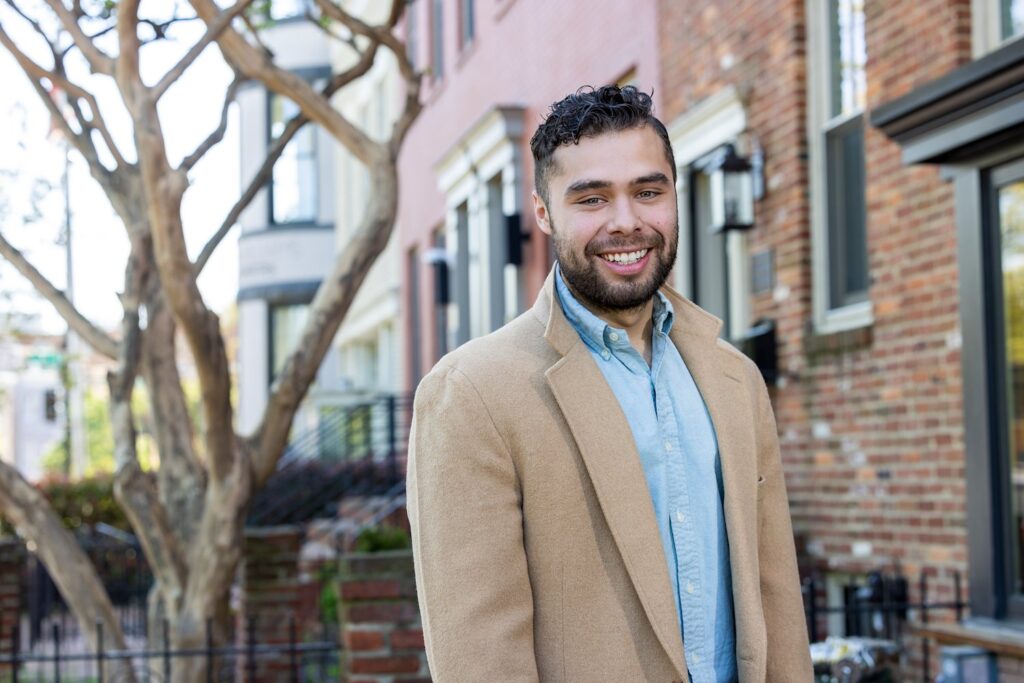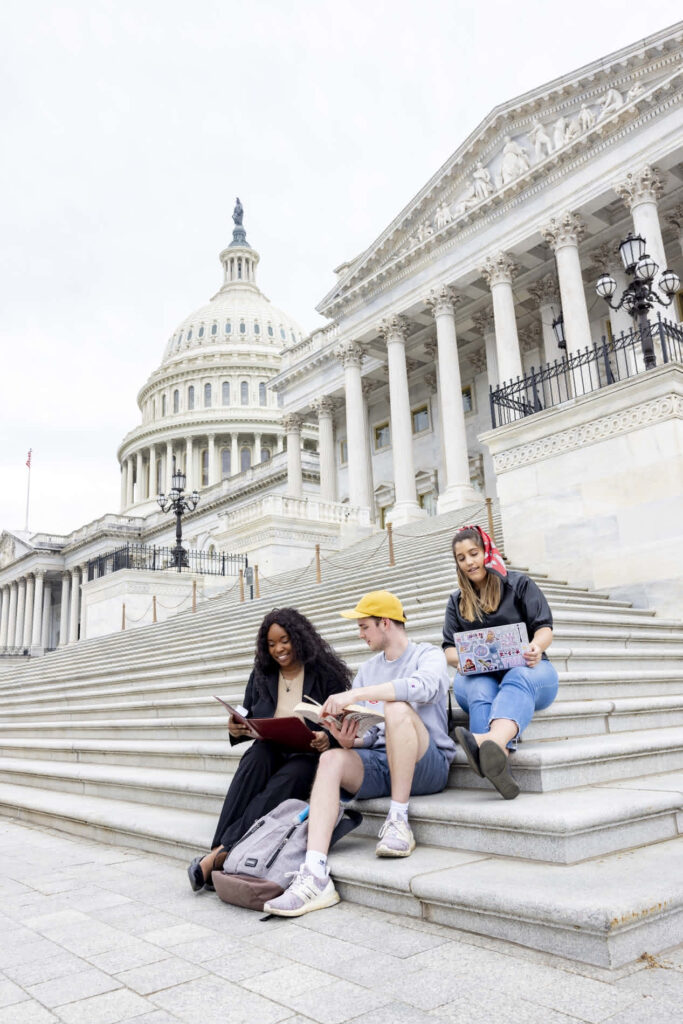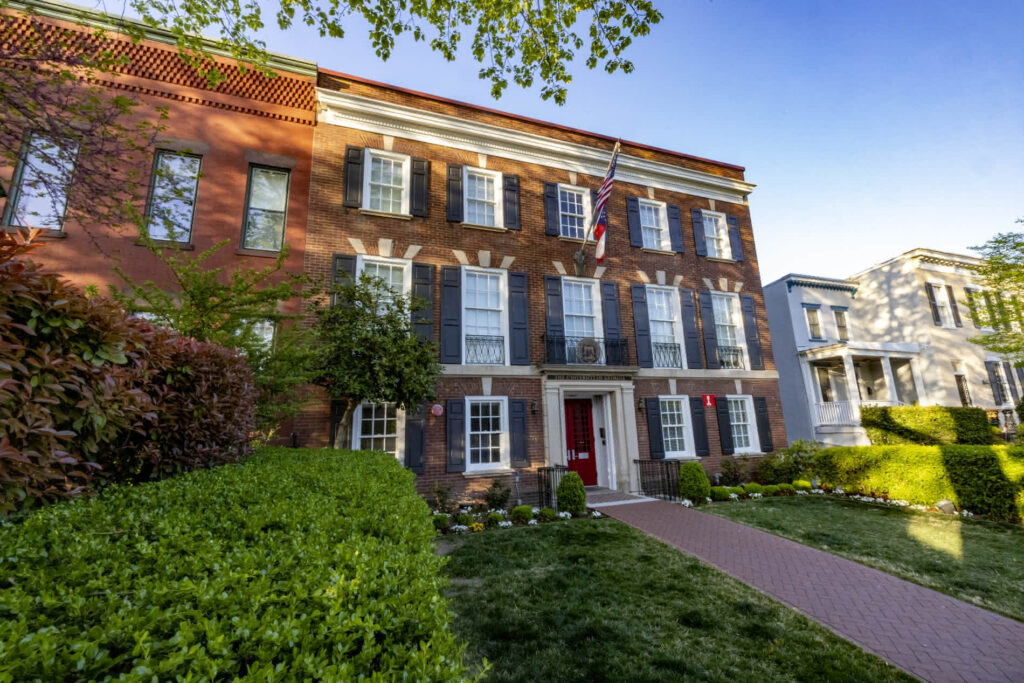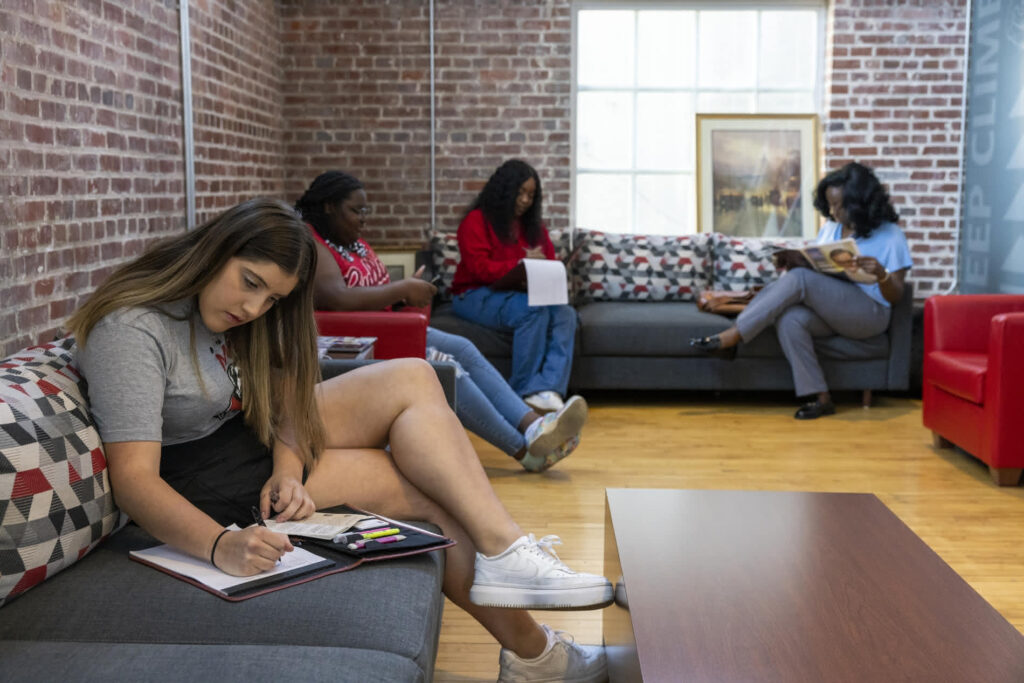Dawgs in DC
UGA’s Washington Semester Program places students in full-time internships in the nation’s capital, leading to life-changing experiences.
William Cano had a simple and practical plan.
The University of Georgia international affairs major would graduate in Fall 2022 at age 23. Then he would work at The Home Depot for a few months before getting a foreign policy-related master’s degree.
Cano, a Mexican immigrant and son of a single mom, is all about practicality. That’s why he joined the Army at 17, knowing it would help pay for his education.

But as practical as Cano is, he’s also very curious.
So when his girlfriend suggested he delay graduation and consider applying for UGA’s Washington Semester Program, he was intrigued. The program connects students to full-time internships in Washington, D.C., while living and learning in UGA’s Capitol Hill residential facility, Delta Hall.
Cano just made the application deadline for the spring 2023 semester.



“I didn’t think I was going to get in,” he admits. And even if he did, he wasn’t sure he could afford to live in Washington.
Instead, he found that not only had he been accepted into the program, but he was named a Chambliss Fellow, the program’s most prestigious scholarship. The path to D.C. was getting a whole lot easier.
He landed an internship opportunity at the think tank American Foreign Policy Council and then had to decide. Would he stick with his original plan or take a chance in Washington?
“For me, it was just taking that leap so that I didn’t stay stagnant,” Cano AB ’23 says.
A Home Base
At any given time, there are thousands of undergraduate students from across the U.S. interning in our nation’s capital. They work for federal agencies, congressional offices, think tanks, museums, and law firms, to name a few opportunities.
Many internships don’t pay, and unless students attend D.C.-area universities, they’re generally on their own to find a place to live in the high-rent area.



UGA’s Washington Semester Program creates a simpler path for students to intern in the District. UGA is one of the few non-D.C.-based universities offering housing for students. Delta Hall, a three-story residential and learning center, is a 10-minute walk from the Capitol Building. The Colonial-style brick building serves as a home base for students to live, study, and share their experiences with fellow UGA students.
And UGA’s dedicated Washington Semester Program helps students make the most of this opportunity by providing internship coaching, networking opportunities, and classes that challenge them to learn and grow from their experiences.
Interning in Washington
For students like Ashni Patel, who interned at the U.S. State Department in the spring, living in Washington was a dream come true. But the reality of working 40 hours a week plus completing her coursework took some adjustment.
“It’s very different than just being a student,” says Patel, a senior international affairs and economics major from Douglas. “In Athens, I stay really busy with extracurriculars in school and friends and everything, but it’s totally different when your life and schedule are dictated by going to work at 9, coming home at 5, and then also going to school right after that.”


Because of the challenge, the Washington Semester Program staff aims to select students who’ve shown a strong work ethic.
“We want to be sure that every time someone interacts with a University of Georgia student, they’re impressed by them, that they feel like we are representing the best of all students across the country,” says Don DeMaria, director of the Washington Semester Program.
A few weeks into the spring semester, Patel settled in and started enjoying the fascinating experience. Sitting through hours-long hearings and taking notes might not sound like a highlight of anyone’s week—much less semester. But Patel geeked out when she attended a five-hour congressional hearing of Secretary of State Antony Blinken.
“Just being in the room with some very important people and hearing them talk about what’s going on in the world,” she says, “you learn so much.”
But it’s not just being in the room with world leaders that pushes these students forward. Like many students in the program, Patel was charged with taking meeting notes or researching topics for her supervisors. So she had to learn the new skill of condensing an hours-long hearing into readable, bite-sized snippets for officials in their office to digest on the go.
“You can’t write anything more than one page or no one’s going to read it,” Patel says. “So learning how to do short-form policy writing for senior officials has been really valuable.”
That form of communication is common in the government and policy world and gives students an advantage when seeking a job.
But Patel’s most valuable takeaway was a confirmation of her career goals.
“I always thought I’d be a civil servant and work here in D.C. But being here has truly opened my eyes that doing something in the foreign service is really exciting,” she says.
Even after a 40-hour work week, students aren’t done.
Twice a week, students meet for required courses taught in Delta Hall. One is a weekly seminar that brings guests to talk about their careers and answer students’ questions. Many speakers are UGA alumni, like Leigh Hildebrand JD ’00, the U.S. Senate’s senior assistant parliamentarian.
“There’s a reason why we have a seminar, and one of the biggest is to get the students all together once a week to talk about their experiences, share their success, meet someone who has had a career on Capitol Hill, and learn from that person and their experiences,” says DeMaria.




DeMaria points to the body of education research that has examined high-impact learning practices.
“It’s clear that student reflection means students don’t just get valuable experiences but that they learn from them,” he says. “Each week is an opportunity to gain a deeper connection between coursework and their internship, so they continue to grow.”

Of course, with full-time jobs and a full course load, there’s not always a lot of downtime. But students still find time to visit museums and historic landmarks, maybe catch a Washington Nationals baseball game, or dine out together at a restaurant.
“Basically managing being a full-time student and working full time is not for the faint of heart,” says Caroline Schneider, a senior who interned at the Justice Department in the spring. “Sometimes fun is just a movie night or a game night here because we’re all in the same boat.”
History on the Hill
Students spend a lot of time at Delta Hall, which has been the home base for UGA activity in Washington since 2015. But the university has had a presence in the capital for more than 25 years.
It’s only gotten stronger over time.
In 1997, UGA launched the Congressional Agricultural Fellowship program, which brings UGA students to Capitol Hill to serve as agricultural liaisons. In 2002, Jere W. Morehead JD ’80, then the director of the Honors Program, expanded UGA’s footprint with the Honors in Washington summer internship program, which DeMaria was hired to lead.
Over time, other UGA schools and colleges initiated their own programs, and in 2008, then-Vice President of Instruction Morehead made these opportunities available to all undergraduate students through the Washington Semester Program and put DeMaria in charge.
UGA established a home in a building called The Congressional, but it lacked the common area and modern classroom space to ensure students connected with each other and the learning experience.

With the limitations at The Congressional and rising housing costs in D.C., Morehead and Bill Young, the UGA Foundation chair at the time, agreed the university needed a new space.
A building a few blocks away was identified as a possible new home. The three-story, 20,000-square-foot building was once a church society and club. When Morehead and Young toured the facility, they saw a lot of promise.
The purchase and renovation of Delta Hall were funded by private gifts to the UGA Foundation; not a single state dollar was used on the facility.
Allison Ausband ABJ ’83, a senior vice president at Delta Air Lines and the current UGA Foundation chair, helped secure a $5 million grant from the Delta Air Lines Foundation to support UGA in Washington. Delta Hall was named in honor of that gift.



Building a Network
Over the years, the program has helped expand the university’s reach in the capital.
Today, a vast network of UGA alumni work in Washington. DeMaria estimates that at least 80 Bulldogs, many program alumni, are involved in activities each year at Delta Hall and beyond. Some come to share their career paths and experiences; others introduce students to people of interest.
At the center of all that activity is DeMaria, who has been a constant in UGA’s activities in Washington. Though not a UGA alumnus (he got his bachelor’s from George Washington University in D.C. and a master’s at Clemson), DeMaria is a walking Rolodex of Georgia connections, and he’s not shy about introducing them to students with shared interests.

For some students, networking opportunities are nearly as important as their internship experiences. Caroline Schneider, who plans to attend law school after she graduates in the spring, found herself ritualistically asking D.C.-area alumni out for coffee.
“I don’t drink coffee,” she admits. “So I’m always asking people to coffee and then not ordering coffee.”
Michael Shinholster AB ’23, who interned for Rep. Buddy Carter, likens networking in Washington to “drinking from a firehose.” He was constantly surprised by the extensive UGA connections in Washington.
“I had someone stop me when I was on my way to work because I was wearing a Georgia sweatshirt,” he says. “He gave me his business card and told me he was from the class of ’97.”
Shinholster has plenty of time to make other connections in Washington. He accepted a position in Carter’s office running the representative’s internship program.
Cano, who took a leap to get to Washington, is also staying in the District post-graduation. His gamble is paying off.
During the spring semester, Cano wrote policy briefs for the American Foreign Policy Council and took advantage of networking opportunities.
Thanks to connections he made with a Delta Hall speaker, Cano earned a fellowship with a program called HillVets. So this fall, he’ll be working on veterans affairs policy in Congress while attending graduate school at American University.
Considering Cano almost didn’t apply for the program, he’s certainly made the most of his experiences.
“I feel like I just can keep building off of this and hopefully achieve something bigger,” he says. “It’s like a whole new deck of cards.”



Providing Opportunities
Several scholarship funds help students lower the costs of living in Washington for a semester.
They include:
- Chambliss Fellowship
- Coyle Scholarship
- Morehead Scholarship
- Pennell Scholarship
- Russell Scholarship
In addition, the UGA Foundation provides each student in the program with a $500 scholarship.
Donate to supporting student scholarships to the Washington Semester Program at: give.uga.edu/wsp
Written by: Aaron Hale
Photography by: Dorothy Kozlowski
Design by: Andrea Piazza
Videography by: Cade Massey